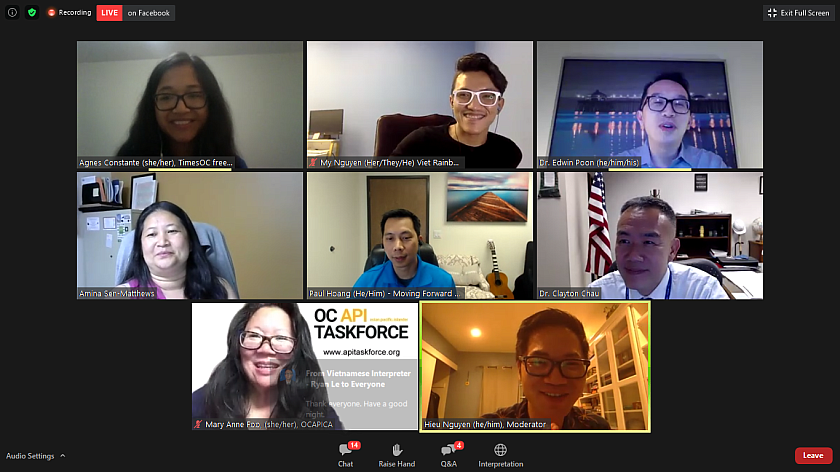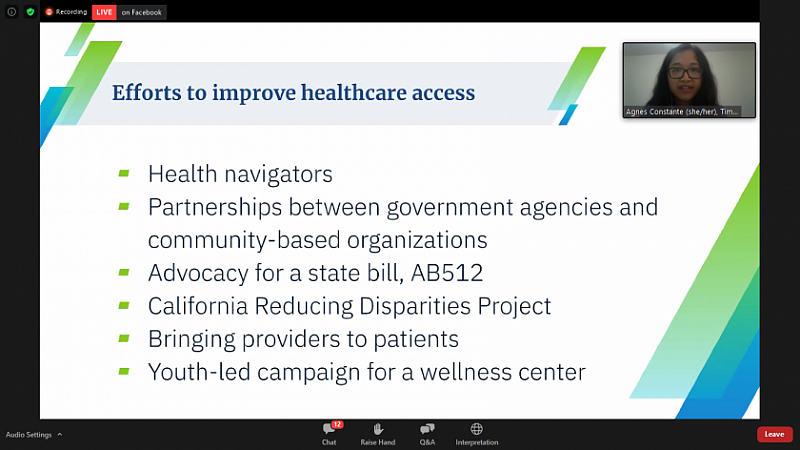Part 4: Community Forum: O.C. mental health leaders brainstorm ways to better serve Cambodian and Vietnamese refugee communities
This story was produced as part of a larger project led by Agnes Constante, a participant in the 2020 California Fellowship, which explores the implications of the lack of access to culturally competent and sensitive health care among Southeast Asian Americans.
Her other stories in this series include:
Part Three: Addressing a lack of culturally sensitive healthcare for Cambodian and Vietnamese communities in O.C.

A screenshot from the “Let’s Talk About Mental Health in the Cambodian & Vietnamese Community,” hosted by TimesOC, USC Annenberg Center for Health Journalism and Viet Rainbow of Orange County on Oct. 22.
TimesOC
By Ada Tseng
For the past six months, since Dr. Clayton Chau took over as the director of the Orange County Health Care Agency, his public remarks have largely centered around explaining and defending the county’s medical response to the coronavirus pandemic.
But in a Oct. 22 virtual forum “Let’s Talk About Mental Health in the Cambodian & Vietnamese Community,” hosted by TimesOC, USC Annenberg Center for Health Journalism and Viet Rainbow of Orange County (VROC), Chau joined a group of Asian American medical providers, officials and advocates to speak about mental health.
The forum was streamed on Facebook Live at facebook.com/timesocofficial/videos/440920580206017.
“Most of you who know me know that I’ve been very public about my own journey in recovery for chronic depression and PTSD related to childhood and youth trauma,” Chau said in the Zoom panel.
Chau and his family fled to the U.S. as a refugee from Vietnam, and he said that the reason he eventually pursued a career as a psychiatrist was because he understood the ways that immigrants experience trauma — and often are retraumatized while trying to build a life for themselves in America.
They can also be misdiagnosed by medical providers who don’t understand their cultural background and history.
The panel was moderated by TimesOC freelancer Agnes Constante and VROC founder Hieu Nguyen. It featured Chau, Orange County Asian and Pacific Islanger Community Alliance (OCAPICA) founder Mary Anne Foo, Moving Forward Psychological Institute founder Paul Hoang, CalOptima director of behavioral health services Edwin Poon, the Cambodian Family health and mental health program director Amina Sen-Matthews and VROC project manager My Nguyen.
The discussion was kickstarted by Constante’s presentation of her three-part TimesOC series “Improving Healthcare Access for Cambodians and Vietnamese,” which was supported by the USC Annenberg Center for Health Journalism 2020 California Fellowship.
A child of Cambodian refugees, Sen-Matthews said she often translated for her parents during medical appointments.
Because about a third of the clients she serves at the Cambodian Family are older adults, she said she “sees her parents in every one of them.”
The Cambodian Family offers workshops to educate their members about preventative health practices and provides health navigators who help patients navigate the healthcare system.
Nguyen shared his experience as someone who had difficulty finding mental health providers who understood both his Vietnamese culture and his LGBTQ identity. He also spoke of the importance of community organizations like VROC, which provide safe spaces for him and other youth.
Hoang emphasized the importance of providers practicing “cultural humility,” reminding his peers that just because someone shares the same ethnic background, that doesn’t mean that they are providing culturally sensitive healthcare.
“We have to be able to allow the person in front of us to be the expert of their experience and be students in that moment to learn,” he said. “And allow the person to teach and share with us and tell us their stories so we can work with them.”
Foo spoke about one of her organization’s recent cases, involving a woman suffering from severe depression and thoughts of suicide. She was the main supporter of her family, and her business was severely affected by the COVID-19 pandemic.
“Through all these stories, you see it’s not only about an individual’s behavior and mental health,” Foo said, explaining how they not only worked with healthcare providers but her business network and her kids’ school district to provide support for her.
“You need to integrate wellness and mental health into all systems … [and] think about all of the barriers to wellness, the root causes of the issues.”
Agnes Constante shares a slide during the “Let’s Talk About Mental Health in the Cambodian & Vietnamese Community,” hosted by TimesOC, USC Annenberg Center for Health Journalism and Viet Rainbow of Orange County on Oct. 22. (TimesOC)
Actionable steps
In Constante’s series, she reported that one of the main barriers was language: 90% of Southeast Asian Americans speak a language other than English at home, while 45% have limited English proficiency.
She pointed to the need to encourage more Vietnamese and Khmer speakers to become certified by the National Board of Certification for Medical Interpreters and the Certification Commission for Healthcare Interpreters.
Other panelists also offered actionable steps moving forward.
Poon said it was important for county agencies like CalOptima to “continue conversations and engagement with community-based organizations, to get feedback so we’re not just looking at it from the traditional view of one-size-fits-all.”
Sen-Matthews spoke about their long-term goal of encouraging Cambodian youth to pursue healthcare as a profession. Currently in O.C., there is only one Khmer-speaking doctor.
She added that when the Cambodian Family was looking to hire a Khmer-speaking therapist, it took them a year to find someone, and he’s currently inundated with cases, especially during the pandemic.
Poon also spoke about CalOptima working with interns and trainees in the beginning stages of their medical careers, with the hope that they’ll continue to support vulnerable communities in the future.
After listening to his fellow panelists, Chau offered a bigger-picture perspective from his viewpoint as an administrator.
“One area we have to address is the sustainability issue of the healthcare system,” said Chau.
He explained that when funding is divided among so many specialized programs, it’s ultimately inefficient and unsustainable.
“It’s going to require all agencies to come together, work, integrate and find a solution that’s most appropriate for the community,” he said.
While Hoang acknowledged that funding is important for sustainability, he also wanted to highlight the impact that community members can have through volunteer work.
“If each of us can donate something, contribute something, together we can create a bigger pool which can be a resource for the community,” he said. “We need to continue to inspire and bring people together to address these needs.”
[This story was originally published by TimesOC.]

